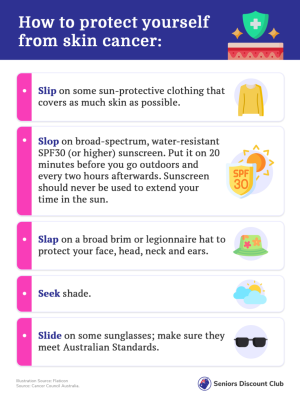Be warned! This popular hobby could double your skin cancer risk
- Replies 2
Ah, golf! A great way to get some exercise outdoors while taking in some fresh air and meeting other people who share your love of the game.
But as wonderful as golf is, over-exposure to the sun can harm your health. According to a recent study by the University of South Australia, golfing may significantly increase your risk of skin cancer.
The study, published in the journal BMJ Open Sport & Exercise Medicine, found a shocking correlation between golfers and skin cancer.
After comparing data from 336 avid golfers who teed off at least once monthly to a larger sample of nearly 16,000 from the general public, the researchers found that golfers were over two times more likely to develop skin cancer in their lifetime than the general population.
Even after accounting for other factors such as age, gender, education, and smoking habits, these results still held true.

'While there are clear health benefits of engaging in golf, this study explored the risks of playing golf as golfers tend to play for four or more hours in the sun, using various sun protection strategies,' said lead researcher Dr Brad Stenner.
He further explained that UV exposure is well documented as a cause of skin cancer and that the golfers involved in the study had a 'significantly higher risk'.
That’s why taking all the necessary precautions if you’re an avid golfer is essential.
High-calibre SPF sunscreens, a sun hat, and protective clothing are all necessary items you should consider to protect yourself from those harmful UV rays.
If you go out golfing, we also highly recommend regular skin checks to ensure your health is in tip-top condition.
In addition to preventive measures, it’s important to consider other ways to protect yourself on the fairway. This may include using pushcarts or motorised carts and avoiding direct exposure to sunlight for extended periods.
Skin cancer develops when skin cells are harmed, often due to excessive exposure to sun ultraviolet (UV) radiation.
In Australia, skin cancer constitutes about 80% of all newly diagnosed cancer cases yearly. This prevalence is primarily attributed to sun exposure. In fact, the incidence of skin cancer in Australia is among the highest globally, surpassing rates in Canada, the US, and the UK by two to three times.
Swift identification and treatment of skin cancer are crucial for avoiding extensive surgical procedures or potential disfigurement and even fatality, especially in the case of severe melanomas or other types of skin cancer.
Consulting your doctor about your risk level and seeking guidance on early detection is also advisable.
To effectively monitor your skin health, it's important to acquaint yourself with the appearance of your skin, particularly any existing spots and moles. By doing so, you can promptly notice any alterations that might indicate the presence of skin cancer.
Keep an eye out for characteristics like crusty sores that don't heal, small lumps coloured red, pale, or pearly, new spots, freckles, or any moles that change colour, thickness, or shape within weeks to months.

We can see why golf is beloved by many, especially Aussies who incorporate it into their routine. However, as the risks of skin cancer become more apparent, it's crucial to make thoughtful choices while on the golf course. This ensures your enjoyment of the game, the sense of community it offers, and your safety.
Members, do you play golf? If not, do you frequently expose yourself to sunlight? If you do, we recommend getting checked for skin issues. Remember, it's wiser to prevent than to cure.
But as wonderful as golf is, over-exposure to the sun can harm your health. According to a recent study by the University of South Australia, golfing may significantly increase your risk of skin cancer.
The study, published in the journal BMJ Open Sport & Exercise Medicine, found a shocking correlation between golfers and skin cancer.
After comparing data from 336 avid golfers who teed off at least once monthly to a larger sample of nearly 16,000 from the general public, the researchers found that golfers were over two times more likely to develop skin cancer in their lifetime than the general population.
Even after accounting for other factors such as age, gender, education, and smoking habits, these results still held true.

A new study claims that golfers are more than twice as likely to develop skin cancer as the general public. Credit: Shutterstock.
'While there are clear health benefits of engaging in golf, this study explored the risks of playing golf as golfers tend to play for four or more hours in the sun, using various sun protection strategies,' said lead researcher Dr Brad Stenner.
He further explained that UV exposure is well documented as a cause of skin cancer and that the golfers involved in the study had a 'significantly higher risk'.
That’s why taking all the necessary precautions if you’re an avid golfer is essential.
High-calibre SPF sunscreens, a sun hat, and protective clothing are all necessary items you should consider to protect yourself from those harmful UV rays.
If you go out golfing, we also highly recommend regular skin checks to ensure your health is in tip-top condition.
In addition to preventive measures, it’s important to consider other ways to protect yourself on the fairway. This may include using pushcarts or motorised carts and avoiding direct exposure to sunlight for extended periods.
Skin cancer develops when skin cells are harmed, often due to excessive exposure to sun ultraviolet (UV) radiation.
In Australia, skin cancer constitutes about 80% of all newly diagnosed cancer cases yearly. This prevalence is primarily attributed to sun exposure. In fact, the incidence of skin cancer in Australia is among the highest globally, surpassing rates in Canada, the US, and the UK by two to three times.
Swift identification and treatment of skin cancer are crucial for avoiding extensive surgical procedures or potential disfigurement and even fatality, especially in the case of severe melanomas or other types of skin cancer.
Consulting your doctor about your risk level and seeking guidance on early detection is also advisable.
To effectively monitor your skin health, it's important to acquaint yourself with the appearance of your skin, particularly any existing spots and moles. By doing so, you can promptly notice any alterations that might indicate the presence of skin cancer.
Keep an eye out for characteristics like crusty sores that don't heal, small lumps coloured red, pale, or pearly, new spots, freckles, or any moles that change colour, thickness, or shape within weeks to months.
Key Takeaways
- A new study by the University of South Australia suggests that golfers are more than twice as likely to develop skin cancer as the general population due to prolonged exposure to harmful UV rays.
- The research analysed health data from an online survey of 336 golfers who played at least once a month, compared to nearly 16,000 Australians from the general population.
- The study found that 27% of golfers had been diagnosed with skin cancer at some point, compared with 7% of the wider population, indicating that golfers were 2.4 times more prone to skin cancer than non-golfers.
- The researchers emphasised the importance of sun protection strategies for golfers, such as high SPF sunscreens, suitable hats, and protective clothing, to reduce their risk.
We can see why golf is beloved by many, especially Aussies who incorporate it into their routine. However, as the risks of skin cancer become more apparent, it's crucial to make thoughtful choices while on the golf course. This ensures your enjoyment of the game, the sense of community it offers, and your safety.
Members, do you play golf? If not, do you frequently expose yourself to sunlight? If you do, we recommend getting checked for skin issues. Remember, it's wiser to prevent than to cure.








